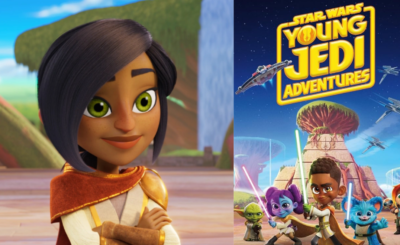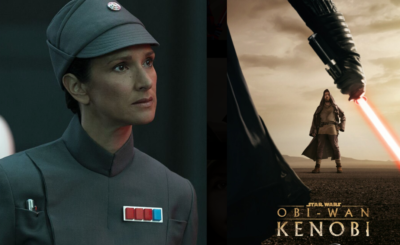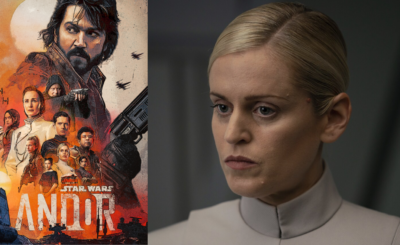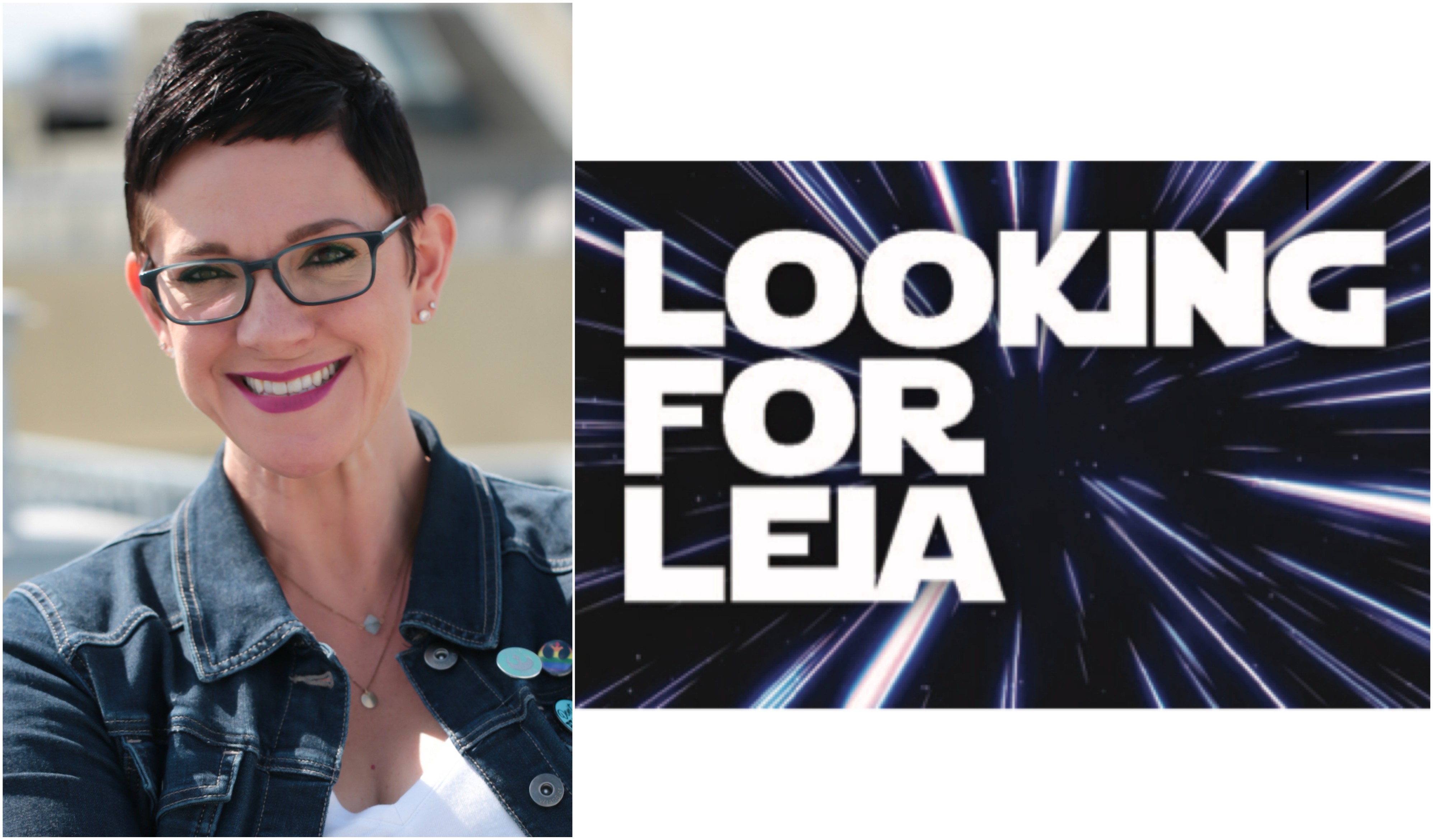
Annalise Ophelian is a documentary filmmaker, psychotherapist, and consultant. She is currently directing and producing the upcoming 6-part docuseries about female Star Wars fandom Looking for Leia. Her previous films include Diagnosing Difference and MAJOR!.
Annalise answered a few questions via email for 365 Star Wars Women about her Star Wars fandom and the making of Looking for Leia.
What is your first Star Wars memory? (Both seeing a Star Wars film and your first memory of being a Star Wars fan).
I saw the original film, which we just called Star Wars back in the day, in the theater in 1977 when I was four years old. And while I have vague memories of my first viewing, my most vivid memories were of the following summer, when it was playing in bargain matinee rotation at the theater within walking distance of my family’s house in Fort Collins, Colorado. They’d program films for kids off school for the summer, it was a lot of Chitty Chitty Bang Bang and the Apple Dumpling Gang, and all I wanted to do week after week was go see Star Wars. I have a great sense memory of the look, feel, and smell of the newsprint the showtimes calendar was printed on. My mom would ask me what I wanted to do and all I wanted to do was go see Star Wars. By the time Empire and then Jedi came out I was fully in the age group to be really captivated by the movies, but I think I was always equally compelled by how they were made, that they were movies. I remember seeing Corvette Summer, and thinking “Oh right, Mark Hamill isn’t Luke Skywalker, he’s an actor, he’s playing a role.” So my first memories of fandom are of voraciously consuming anything I could about how the movies were made. The little “making of” featurettes on the VHS tapes were like gold to me.
Are you a Star Wars fan of just the films or have you dived into the books, TV shows, and comics as well?
I started out as a fan of the OT films, and then I sort of missed out on the EU. I remember finding Heir to the Empire and loving it, it was the first time I realized there were Star Wars books, so I went looking for more and found the EU and was overwhelmed by the size of it. I’m the sort of audience that likes an author or a filmmaker to tell me what the story is, the “official” version, so the fact that some of the books contradicted themselves was horrifying to me! This is a problem I’ve always had with comic books as well, too many characters die and are resurrected and multiverses are great to a point but then it’s just like none of this counts, you’re just going to re-do it anyway! But this is just the sort of audience member I am, I really love canon, simply as a point of organization. Not that it’s right or better, it just gives me a guideline, like, read these stories and we’ll work hard to keep the story consistent.
But this is a huge digression. I loved the OT, and like most folks of my generation the PT did not hit the mark with me, although I did love Darth Maul. But it seemed like Star Wars was over, and I moved on to Star Trek TNG and Buffy and the like. I was late to the Clone Wars, but when I found it I was really in love with it, and it helped me appreciate the story of the prequels. Like, it’s this really great story about colonialism and empire building and how best intentions can give birth to incredibly oppressive regimes. I finished Clone Wars after it had already ended, so I got to binge most of it, and picked up with Rebels, which I also love. And I’m really enjoying the new Marvel comics, they are some of my favorite new editions to the story. There was a minute when I thought I was going to keep up on the new canon books, but that minute has passed, I just don’t have the time. But I love Claudia Gray, Bloodline and Leia: Princess of Alderaan were just splendid. I’m a huge Dr. Aphra fan, and I really love how we get more characters in the comics. Phasma has a great arc in her comic, that really enhances the story of the film for me. And we get all these women, and queer women and women of color in the comics that we don’t get on screen.
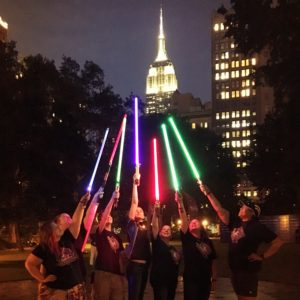 Have you been active in Star Wars fandom before Looking for Leia (conventions, social media forums, writing, etc.)?
Have you been active in Star Wars fandom before Looking for Leia (conventions, social media forums, writing, etc.)?
I’d never participated in social media based fan communities before starting work on the series. I went to conventions, somewhat casually, starting in the 1990s, starting with Star Trek conventions and moving on to my local comicons, zombie conventions, when they were still pretty tiny regional gatherings. I went to WonderCon a couple of years in a row and then in 2015 my younger brother (@PloPoPro), who has always been my con buddy, suggested we save our money and wait a couple of weeks and go to Celebration in Anaheim instead. And that was sort of a game changer for me, up until that point I always went to cons and sort of sifted my way through things to find what I liked, and at Celebration I was really reunited with how Star Wars was my first and most central fandom, and being in that space with only Star Wars content was just amazing. Being on Star Wars Twitter ™ has been a similarly amazing experience, I’ve gotten to connect with folks all around the world, and particularly with women and other queer folks and non-binary folks who I’d never have found without social media.
Is there a current female Star Wars character you think would be a good fit for a stand-alone movie?
Honestly anyone from the comics. Dr. Aphra, Sanna Solo, Evan Verlaine, Breha Organa, Shara Bey. Also Hera Syndulla is everything, but I sort of love her too much in animation to ever want to see her in live action. I think the stand alone movies work best around iconic characters, I’m really excited for an Ewan as Obi-Wan stand alone for instance, or around interstitial moments in iconic story arcs. I loved Rogue One, that film was as much about the characters as it was about filling in this pivotal piece of the story, I think Chuck Wendig’s work does that, too. But you know, we haven’t had women in recognizable enough roles to hold down a stand alone, outside of Leia. Like, I’d love an Aayla Secura stand alone, but I think it would be me and like 10,000 hard core Aayla Secura fans sitting in a theater and I don’t imagine a studio is going to justify that expense!
Why did you decide to direct Looking for Leia? Was there a specific inspiration (like another documentary) or a specific moment that inspired the idea of this project?
When I came home from Celebration 2015 I had this tremendous con drop when I realized I wasn’t going to get to talk about Star Wars with the person standing next to me for 12 hours a day, and I was also really struck by the number of women I’d seen and spoken to there. The gender balance was still predominantly cis dudes, but there was a much greater consideration, guys listened to what I had to say and folks were kind and generous and it left me feeling really hopeful. And it left me wondering: If I’m clearly not an anomaly as a female Star Wars fan, who are all these other women, what’s their story?
 At the time I was in the final stages of post production on my film MAJOR! (http://www.missmajorfilm.com), and that was a hard production, emotionally. There were several deaths in our community and in our family during the course of production, and I felt like I was creating through grief and also feeling very aware of the fact that at that point I had helmed two features about trans experience, and this is something that I think cis people shouldn’t do, so I was in constant conversation with myself and with my partner (@StormMiguel, who was my co-producer) and our Advisory Board about connection and accountability to community. And then the 2016 election started gearing up, and in the fall I decided look, I want my next project to be one where I’m really in my lane, I’m making a project that includes the position I’m standing in, and I want to do something with cultural significance but that is really joyous, because the vicarious trauma had really left me feeling like I just couldn’t make another film.
At the time I was in the final stages of post production on my film MAJOR! (http://www.missmajorfilm.com), and that was a hard production, emotionally. There were several deaths in our community and in our family during the course of production, and I felt like I was creating through grief and also feeling very aware of the fact that at that point I had helmed two features about trans experience, and this is something that I think cis people shouldn’t do, so I was in constant conversation with myself and with my partner (@StormMiguel, who was my co-producer) and our Advisory Board about connection and accountability to community. And then the 2016 election started gearing up, and in the fall I decided look, I want my next project to be one where I’m really in my lane, I’m making a project that includes the position I’m standing in, and I want to do something with cultural significance but that is really joyous, because the vicarious trauma had really left me feeling like I just couldn’t make another film.
So this idea of Looking for Leia was born. Originally I developed it as a road trip doc, I was going to drive around the U.S. talking with Star Wars fans and collect enough material that Carrie Fisher, or her reps, would say absolutely Ms. Fisher will talk with you on camera and we’d end talking with her about her iconic role. As I was touring MAJOR! this was the concept I was developing. And then the election happened, and then Carrie died, and like so many people I was gutted. And I felt like the project died with her. And after a couple of weeks of doing that ugly crying in public with no provocation thing, my partner said “you know, there’s never been a better time for this film. You have to do this, you have to go to Celebration in Orlando and talk with women about what she meant to them, what their fandom means to them.” And around that time I saw the first announcement for the Drowning in Moonlight gala, and I spoke with the organizers, who invited us to come and film, and it took off from there.

How has the production of Looking for Leia differed from previous projects you have directed?
I’ve never worked on any topic as mainstream as this, I mean, you can’t get much more mainstream than Star Wars. And of course, the new movies have all come out during the pre-production and production of this series, and I don’t think I was prepared for what a huge global juggernaut it would be. How could I not be prepared for that? So suddenly my story is less about outsider culture and more about what’s it like to love the most commercially successful trans media franchise of all time? Navigating all of those spaces from my scrappy queer indie filmmaker position is a constant exercise in mustering confidence and stepping up to the plate, but then, I think that’s filmmaking for anyone who isn’t a cis guy. What’s the same about this project is that I work with participant involvement. My work examines phenomenology and there’s a parallel process around stories of representation and how that representation is made. So I ask folks who speak on film to review their spoken contributions in the edit, because folks might talk with me for an hour and I might use three minutes of that footage, and the edit is a tremendously subjective place. I’ll never claim objectivity and that’s not my goal, my goal is to have multiple subjectivities all sharing space and fleshing out a story, and for participants to look at themselves on screen and say yes, that’s authentically me.
Can you share any highlights from the making of Looking for Leia so far?
Oh god, I’m fresh in it so it’s hard not to think of all the things I wish I could have done more of. I wish I had a Clone Army for a crew and we could spread out all over the globe. I know that for every one woman on screen there’s 10,000 amazing stories we’ll never hear. I wish that gendered terms that don’t re-inforce gender binaries were more available in the cultural short hand. But you asked me about highlights, okay, happy beeps. I mean, I got to wear lekku, and I sprained my MCL in lightsaber class, and I got to hear all of these incredible women talk about something they love that brings them joy. There’s a moment in almost every interview where folks cry, and it’s rarely around a story that’s painful. It’s almost always when women are talking about what it feels like to see yourself represented. We can hashtag how representation matters, but this isn’t an intellectual concept, it’s rooted in our deepest sense of self.
I think women, and especially women of color, queer women, trans women and non binary folks, disabled women, we’re so used to being erased in the media we love and consume. And Star Wars has some truly iconic female leads, and also isn’t different from any other popular culture in who isn’t in the picture, it’s a both/and. But when women talk about what it feels like to see yourself reflected back, to be allowed to occupy the role of hero, to lead the lightsaber class and be the Jedi and build a robot with your own two hands, and the power and essential human dignity of that moment makes you realize how adeptly you’ve learned to live without it. And that’s a really emotional moment, and I’ve shared that moment with a lot of women over the past year, it’s powerful and I’m deeply grateful for it.
If you could go back in time and interview Carrie Fisher what questions would you have liked to ask her? What does Carrie Fisher mean to you as a Star Wars fan?
Well, I tried a few times to answer this and just start crying. While I’ve been a Star Wars fan all my life, I became a Carrie Fisher fan in 1990 when I read Surrender the Pink and saw Postcards from the Edge, those two things happened in the same year. I was in my first year of college and Carrie Fisher was owning herself in this fierce way I’d never seen in a public figure before. Before Carrie I’d never seen anyone who so proudly led with her crazy, and demanded respect for it, for madness being a perfectly acceptable way of being in the world. It was liberating, there was a real conversation in queer community at that time about outting and being out, and I saw Carrie Fisher being out about her mental health and substance abuse concerns, and that had a huge impact on me. I love her interviews, I love her humor and her writing and I’m so grateful we still have that. I’m hoping her voice can still be a part of the project in archival interview form, because she had so much to say about gender and media representation. I’m so grateful for her performance in The Last Jedi, it was so masterful. I was a child who grew up with 19 year old Princess Leia, I got to watch one of my childhood heroes grow up to be a general. I’ll never be disappointed in that.
 When did you decide to change Looking for Leia from a documentary to a series?
When did you decide to change Looking for Leia from a documentary to a series?
In January, when I sat down to work on my first assembly, I realized that to fit this to ~85 minutes I was going to need to be highly selective in what stories were told, and huge amounts of what we shot were going to end up on the cutting room floor. The first thought is always “well, I’ll make outtake shorts,” which is really ambitious and never happens the way you think it’s going to. And then I started outlining it as a series and it just flowed, it opened up my ability to tell different parts of the stories with some breathing room. And I love the series format, I think it’s very current and how we’re consuming media today. The episodes are a half hour long, so they’re easy to watch, and they’re thematically programmed, so if you’re really not interested in cosplay you can skip that episode and get right to droid building. It served the story better, and the footage we had better. But of course, it also necessitates a bit more interviewing and writing to stitch all the story pieces together, and we’ll need more b-roll and art.
How can people find out more about and help support the production of Looking for Leia?
Right now we’re doing our post production crowd funding on Seed and Spark, which is a really important part of building audience and enthusiasm for this project as much as money. So, it’s free to follow us on the campaign, and we’re aiming for 1000 followers so we can be eligible for thousands of dollars in post-production resources and additional grant money. And people supporting us financially is everything, we’re not backed by a studio and individual contributions go directly to paying our amazing crew and covering licensing costs and all the things it takes to bring a project like this to life. Also, we love networking. Folks who are connected to media, to post-production services, and at this point to academics and cultural pundits who would like to swoop in and help us tie some of our narratives together in our pick up interviews, those connections are incredibly helpful. The Seed and Spark is live until 9 pm April 20th and we want to hugely over fund this and have 1000+ followers. It’s a huge show of confidence from the audience that people want to see something like this get made, and that audience vote of confidence will absolutely follow us into pitch meetings with networks and streaming services.
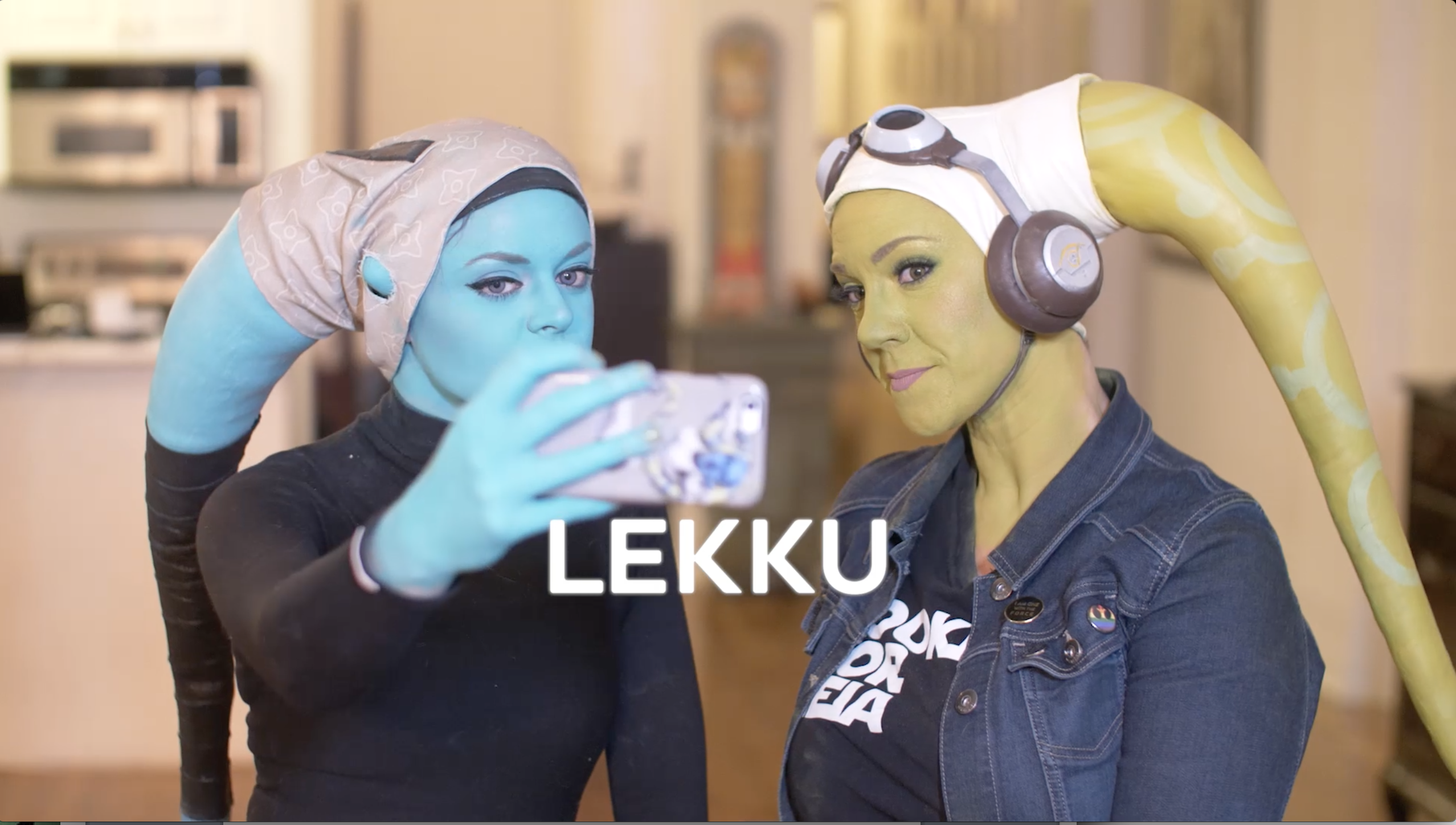
A woman has never directed any Star Wars production (films, TV series episodes, Forces of Destiny, etc.) Why do you think that is and do you think that’s a problem for Star Wars going forward?
I think the lack of women behind the camera, and the lack of women of color and folks of color generally and queer and trans folks, is absolutely a problem for the entire industry. It matters who tells the story, and up until this point, we’ve had an incredibly homogenous group of white cishet men controlling all of filmmaking. And I’m not bashing on white cishet dudes, but I am saying opportunities are given to this group, confidence is placed in them, they’re allowed to fail over and over and be given third and fourth and fifth chances with millions of dollars in budget, when your directing and producing pool is that culturally consistent you’re not looking at who is best for the job, you’re looking at who has the most access to the resources and avenues that lead to the job.
Think about the patience and nurturing Spielberg got on Jaws. We love telling the story of this trainwreck production, the shark didn’t work and they let him keep shooting, the studio kept the faith and we ended up with a genre changing film and the birth of one of the most prolific directors of the 20th century. And now imagine what it would be like if young Latina women or young queer or non binary folks were given that much leeway to try and possibly fail. Imagine if we fuck up the shark, and are still given millions of dollars to go over budget, given the resources to try and try again until we nail it. I don’t just want more women, and especially more women living at the intersection of multiple sites of identity, to be behind the camera. I want us to get behind the camera with full studio support and be allowed to fuck up the shark. I think that’s how we find the next generation of auteurs, by supporting and encouraging experimentation and bold story telling.
You can find Annalise Ophelian on twitter @Dr_Ophelian and Looking for Leia @LookingForLeia .
You can watch Annalise’s documentary MAJOR! right now on Amazon Prime.
Below please check out the trailer for Looking for Leia. The Seed & Spark campaign is active until April 20th, 2018 and just following the campaign (which is free) is remarkably helpful in getting Looking for Leia a great streaming home. Bias alert: I’m currently working as a researcher for Looking for Leia. But I have no doubt I would be just as enthusiastic about its success if I wasn’t involved with the production because, well, I like to write about women in Star Wars 🙂
Check out the entire list of women in 365 Days of Star Wars Women in the Women in Star Wars Index. It includes highlights from each post plus notes which posts include new 365 interviews with actresses, writers, artists, and more.


